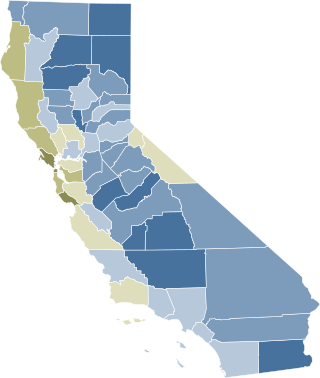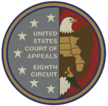
The United States District Court for the District of Nebraska is the federal district court whose jurisdiction is the state of Nebraska. Court offices are in Omaha and Lincoln.

Utah Constitutional Amendment 3 was an amendment to the Utah state constitution that sought to define marriage as a union exclusively between a man and woman. It passed in the November 2, 2004, election, as did similar amendments in ten other states.

Ballot Measure 2 of 1998 is a ballot measure, since ruled unconstitutional, that added an amendment to the Alaska Constitution that prohibited the recognition of same-sex marriage in Alaska. The Ballot measure was sparked by the lawsuit filed by Jay Brause and Gene Dugan, after the two men were denied a marriage license by the Alaska Bureau of Vital Statistics. In Brause v. Bureau of Vital Statistics, 1998 WL 88743, the Alaska Superior Court ruled that the state needed compelling reason to deny marriage licenses to same-sex couples and ordered a trial on the question. In response, the Alaska Legislature immediately proposed and passed Resolution 42, which became what is now known as Ballot Measure 2. Ballot Measure 2 passed via public referendum on November 3, 1998, with 68% of voters supporting and 32% opposing. The Bause case was dismissed following the passage of the ballot measure.

Nebraska Initiative 416 was a 2000 ballot initiative that amended the Nebraska Constitution to make it unconstitutional for the state to recognize or perform same-sex marriage, same-sex civil unions or domestic partnerships. The referendum was approved on November 7, 2000, by 70% of the voters. The initiative has since been struck down in federal court and same-sex marriage is now legally recognized in the state of Nebraska.

Kentucky Constitutional Amendment 1 of 2004, is an amendment to the Kentucky Constitution that made it unconstitutional for the state to recognize or perform same-sex marriages or civil unions. The referendum was approved by 75% of the voters.
Same-sex marriage has been legal in Florida since January 6, 2015, as a result of a ruling in Brenner v. Scott from the U.S. District Court for the Northern District of Florida. The court ruled the state's same-sex marriage ban unconstitutional on August 21, 2014. The order was stayed temporarily. State attempts at extending the stay failed, with the U.S. Supreme Court denying further extension on December 19, 2014. In addition, a state court ruling in Pareto v. Ruvin allowed same-sex couples to obtain marriage licenses in Miami-Dade County on the afternoon of January 5, 2015. In another state case challenging the state's denial of marriage rights to same-sex couples, a Monroe County court in Huntsman v. Heavilin stayed enforcement of its decision pending appeal and the stay expired on January 6, 2015. Florida was the 35th U.S. state to legalize same-sex marriage.

Same-sex marriage has been legal in Hawaii since December 2, 2013. The Hawaii State Legislature held a special session beginning on October 28, 2013, and passed the Hawaii Marriage Equality Act legalizing same-sex marriage. Governor Neil Abercrombie signed the legislation on November 13, and same-sex couples began marrying on December 2, making Hawaii the fifteenth U.S. state to legalize same-sex marriage. Hawaii also allows both same-sex and opposite-sex couples to formalize their relationships legally in the form of civil unions and reciprocal beneficiary relationships. Civil unions provide the same rights, benefits, and obligations of marriage at the state level, while reciprocal beneficiary relationships provide a more limited set of rights. When Hawaii's civil union law took effect at the start of 2012, same-sex marriages established in other jurisdictions were considered civil unions in Hawaii.

Proposition 8, known informally as Prop 8, was a California ballot proposition and a state constitutional amendment intended to ban same-sex marriage; it passed in the November 2008 California state elections and was later overturned in court. The proposition was created by opponents of same-sex marriage in advance of the California Supreme Court's May 2008 appeal ruling, In re Marriage Cases, which followed the short-lived 2004 same-sex weddings controversy and found the previous ban on same-sex marriage unconstitutional. Proposition 8 was ultimately ruled unconstitutional by a federal court in 2010, although the court decision did not go into effect until June 26, 2013, following the conclusion of proponents' appeals.

Joseph Francis Bataillon is a senior United States district judge of the United States District Court for the District of Nebraska.
Same-sex marriage has been legal in Arizona since October 17, 2014. The U.S. state had denied marriage rights to same-sex couples by statute since 1996 and by an amendment to its State Constitution approved by voters in 2008. On October 17, Judge John W. Sedwick ruled in two lawsuits that Arizona's ban on same-sex marriage was unconstitutional, and enjoined the state from enforcing its ban, effective immediately. Attorney General Tom Horne said the state would not appeal that ruling, and instructed county clerks to comply and issue marriage licenses to same-sex couples.

The American Foundation for Equal Rights (AFER) was a nonprofit organization active in the United States from 2009 through 2015. The organization was established to support the plaintiffs in Hollingsworth v. Perry, a federal lawsuit challenging California's Proposition 8 under the Due Process and Equal Protection Clauses of the Fourteenth Amendment to the United States Constitution. AFER retained former United States Solicitor General Theodore B. Olson and David Boies to lead the legal team representing the plaintiffs challenging Proposition 8.

Lesbian, gay, bisexual, transgender, and queer (LGBTQ) people in the U.S. state of Nebraska may face some legal challenges not experienced by non-LGBTQ residents. Same-sex sexual activity is legal in Nebraska, and same-sex marriage has been recognized since June 2015 as a result of Obergefell v. Hodges. The state prohibits discrimination on account of sexual orientation and gender identity in employment and housing following the U.S. Supreme Court's ruling in Bostock v. Clayton County and a subsequent decision of the Nebraska Equal Opportunity Commission. In addition, the state's largest city, Omaha, has enacted protections in public accommodations.
Same-sex marriage has been legal in South Dakota since June 26, 2015 when the U.S. Supreme Court ruled in Obergefell v. Hodges that the U.S. Constitution guarantees same-sex couples the right to marry. Attorney General Marty Jackley issued a statement critical of the ruling but said South Dakota is obligated to comply and the state would recognize same-sex marriages.
Same-sex marriage has been legal in Nebraska since June 26, 2015, when the U.S. Supreme Court ruled in the case of Obergefell v. Hodges that the denial of marriage rights to same-sex couples violates the Fourteenth Amendment to the U.S. Constitution. Following the court ruling, Attorney General Doug Peterson announced that the state of Nebraska would comply and recognize same-sex marriages.
This is a list of notable events in the history of LGBT rights that took place in the year 2014.
Same-sex marriage has been legal in Kentucky since the U.S. Supreme Court's ruling in Obergefell v. Hodges on June 26, 2015. The decision, which struck down Kentucky's statutory and constitutional bans on same-sex marriages, was handed down on June 26, 2015, and Governor Steve Beshear and Attorney General Jack Conway announced almost immediately that the court's order would be implemented.
Tanco v. Haslam was the lead case in the dispute of same-sex marriage in Tennessee. A U.S. District Court granted a preliminary injunction requiring the state to recognize the marriages of the plaintiffs, three same-sex couples. The court found the equal protection analysis used in Bourke v. Beshear, a case dealing with a comparable Kentucky statute "especially persuasive." On April 25, 2014, that injunction was stayed by the Sixth Circuit Court of Appeals. Tanco was appealed to the Sixth Circuit, which reversed the district court and upheld Tennessee's refusal to recognize same-sex marriages from other jurisdictions on November 6.

Geiger v. Kitzhaber is a decision by the U.S. District Court for the District of Oregon that requires Oregon to allow same-sex couples to marry and to recognize same-sex marriages established in other jurisdictions. The decision arose from two consolidated cases that alleged that Oregon's constitutional ban on same-sex marriage, Article 15, § 5, and all related marriage statutes, violate the Due Process Clause and the Equal Protection Clause of the Fourteenth Amendment to the United States Constitution. Among the several defendants, Attorney General Ellen Rosenblum filed appearances in the case to defend Oregon's position, but declined to defend the constitutionality of the bans and ordered state agencies to recognize the validity of same-sex marriages established elsewhere.
Same-sex marriage has been legal in Missouri since the U.S. Supreme Court's landmark ruling in Obergefell v. Hodges, which struck down state bans on marriages between two people of the same sex on June 26, 2015. Prior to the court ruling, the state recognized same-sex marriages from other jurisdictions pursuant to a state court ruling in October 2014, and certain jurisdictions of the state performed same-sex marriage despite a statewide ban.
Same-sex marriage has been legal in Arkansas since the U.S. Supreme Court's landmark decision in Obergefell v. Hodges on June 26, 2015, striking down same-sex marriage bans nationwide. Prior to this, same-sex marriage in Arkansas was briefly legal for a period beginning on May 9, 2014, as a result of a ruling by Sixth Judicial Circuit Judge Chris Piazza striking down the state's constitutional and statutory bans on same-sex marriage as violating the U.S. Constitution. Approximately 541 same-sex couples received marriage licenses in several counties before the Arkansas Supreme Court stayed his ruling pending appeal on May 16, 2014.










